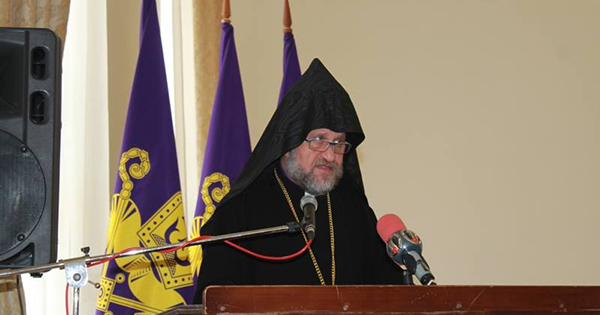Father, Archbishop Babken Charian: “We are seeing a new road opening after April 24th”

Hayern Aysor’s correspondent sat down for an interview with Primate of the Armenian Diocese of Isfahan, Father, Archbishop Babken Charian, who is currently in Armenia and participated in the events commemorating the Centennial of the Armenian Genocide.
Hayern Aysor: Your Holiness, could you please tell us about the Armenian community of Isfahan?
Father Babken Charian: Iran has three independent dioceses in Atrapatakan, Tehran and Isfahan. All three dioceses are guided with the spirit of the constitution adopted by the Catholicosate of the Great House of Cilicia.
The Armenian Diocese of Isfahan has a legislative body called the Assembly of Delegates, which elects members for two executive councils (diocesan, religious) and one auditor.
The diocesan and religious councils designate sub-councils, and the members of the Assembly of Delegates are elected by the people. We have two deputies in the Islamic Parliament of Iran who are also elected by the people.
As far as the Armenian community is concerned, it gives me pleasure to say that it is a community that lives with the spirit of Armenians and for Armenians. The Armenians of Isfahan are the Armenians who have preserved their national identity and have stayed clung to their roots by preserving national values, sanctities and traditions for more than 400 years.
We obviously have close relations with other Armenian unions and organizations within the community. The national authorities always collaborate with and, in case of need, sponsor all unions and organizations.
Those unions and organizations maintain relations with Armenian unions and organizations outside of Iran, and the relations with other Armenian communities in the Middle East are maintained through the Catholicosate of the Great House of Cilicia.
The three dioceses collaborate at the level of leaders and national authorities. They also work together in the fields of religion and education.
We often meet to discuss issues related to our rights, as well as issues related to religion and education.
It should be mentioned that the Iranian people and government respect and have a friendly attitude towards the Armenians of Iran. For instance, the Azerbaijanis on the other side of Arax River completely eradicated the cross-stones of Old Julfa, but on the other side of the river, the Iranian government supports us so that we can preserve Armenian cultural monuments and our heritage.
Of course, we also collaborate through the office for dialogue between atheists. The office often organizes assemblies that provide opportunities to get to know each other better and collaborate.
Hayern Aysor: What are the foundations for the cooperation between the Armenian community and the RA Ministry of Diaspora?
Father Babken Charian: The community collaborates with the RA Ministry of Diaspora. We receive official news about the Republic of Armenia and the reality in Armenia through the Armenian Embassy, the RA Ministry of Diaspora, as well as other official sources.
Hayern Aysor: Your Holiness, what kinds of events has the Armenian community held in commemoration of the Centennial of the Armenian Genocide?
Father Babken Charian: First, I must say that we have an Armenian Genocide Centennial Committee. The president is the Primate, and the chairman is chairman of the diocesan council of the Armenian Diocese of Isfahan, Mr. Noel Minasian.
The members of the Committee are the chairmen of all the unions of the Diocese and the Armenian National Committee. the Armenian Genocide Centennial Committee has designated eight subcommittees that are working according to their plans.
Throughout the year, they will hold campaigns, publish books, hold seminars at universities, carry out state programs, as well as lectures and cultural programs that have already begun and will be ongoing. There are programs that are being carried out by youth and student unions.
Hayern Aysor: Your Holiness, April 24th marked the Centennial of the Armenian Genocide. How do you think we should solve the Armenian Question from now on?
Father Babken Charian: The Centennial of the Armenian Genocide was not an ordinary milestone. We are seeing a new road opening after April 24th. We have to be more alert and defend our claims legitimately in order to not only achieve recognition and see reparations, but also to see the return of our lands and our ancestral lands.
Interview by Gevorg Chichyan




 Արևելահայերեն
Արևելահայերեն Արևմտահայերեն
Արևմտահայերեն Русский
Русский






